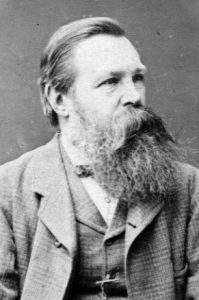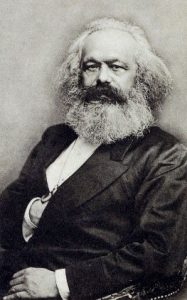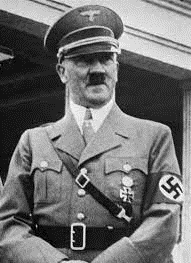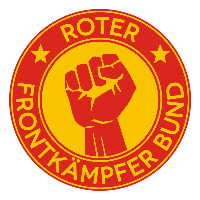“Those who don’t know history are doomed to repeat it.”
(Edmund Burke)
Karl Heinrich Marx (1818-1883) was the son of a lawyer with a comfortable
 upper middle-class income and the owner of several of vineyards along the Moselle River. Friedrich Engels (1820- 1895) was born into the wealthy Engels family, owners of large cotton-textile mills in the expanding industrial metropoles of Barmen and Salford. These two German philosophers, political theorists, social scientists and journalists saw that the French Revolution of 1789 had elevated an artillery officer, Napoleon Bonaparte, to the position of General at age 24, and later to “Emperor of France.” In their ambition, they viewed this as an opportunity to rise to power through a revolution, but on a global scale.
upper middle-class income and the owner of several of vineyards along the Moselle River. Friedrich Engels (1820- 1895) was born into the wealthy Engels family, owners of large cotton-textile mills in the expanding industrial metropoles of Barmen and Salford. These two German philosophers, political theorists, social scientists and journalists saw that the French Revolution of 1789 had elevated an artillery officer, Napoleon Bonaparte, to the position of General at age 24, and later to “Emperor of France.” In their ambition, they viewed this as an opportunity to rise to power through a revolution, but on a global scale.
They created the Communist League – an international secret society which on February 21, 1848 was revealed when they published The Communist Manifesto, laying the groundwork for modern communism. The Communist Manifesto set forth the principal basis of Marxism: “The history of all hitherto existing society is the history of class struggles.”
Marx and Engels understood that people would usually act in accordance with their own economic interests. To exploit this, they asserted that there was a clash of interests between the Bourgeoisie, who owned businesses, and the Proletariat (working class), which worked in those businesses. Marx and Engels then postulated that by appealing to the desires of the Proletariat they could mobilize the masses to start a revolution and reorganize society.
Following the defeat of several uprisings across Europe in 1848, the Communist League changed tactics. They encouraged the working class to join with bourgeois and democratic forces to defeat the feudal aristocracy first and bring about the successful conclusion of the bourgeois revolution. Afterwards they transitioned to the working-class agenda, thereby moving toward a Proletariat revolution through different stages of gradual social change.
In Marxist theory, Socialism is a transitional state between the overthrow of capitalism and the realization of Communism.
The dictionary defines Socialism as a political and economic theory of social organization which advocates that the means of production, distribution, and exchange should be owned or regulated by the community as a whole, in practice through a centralized government.
Prior to Socialism, the political and economic systems were separate entities. The government would distance itself from the private sector economy and support itself through fees, taxes, tariffs and income from its property’s lessees.
Socialism combines the political and economic systems, which means that politicians and bureaucrats secure a monopoly on power by controlling the economy.
After Marx and Engels’ time, socialism took root in different places and under varying forms, depending on the local circumstances, ambitions and desires of ruling dictators.
Today Sweden is championed by many as example of working Socialism. Sweden (population of 10 zmil.) has an export-oriented economy aided by timber, hydropower, and iron ore. A strong welfare state involving transfer payments may be confused with socialism, but the problem is that the competitive, highly liberalized, open market economy of Sweden contradicts the merits of socialism. Only 24% percent of the national wealth of Sweden is owned by the government.
On the other hand, Venezuela, which used to be the sixth largest member of OPEC by oil production, was the wealthiest country in South America until 1999 when Hugo Chávez was elected President.
Hugo Chávez, a paratroop lieutenant-colonel born into a middle-class family, was the founder of the clandestine Revolutionary Bolivarian Movement-200 (MBR-200) which on February 4, 1992, executed an unsuccessful coup. Chávez was sent to prison, but the coup attempt brought him into the national spotlight. Pardoned from prison two years later by President Rafael Caldera, Chávez founded the Fifth Republic Movement political party. In 1998 he ran for president on a platform that called for a new constitution, a new name for Venezuela (“the Bolivarian Republic of Venezuela”) and a new set of relations between socioeconomic classes.
 After adopting the new constitution in 1999, Chávez focused on enacting social reforms as part of the Bolivarian Revolution. He implemented three main policies which are the pillars of socialism: Widespread nationalization of private industry; currency and price controls; and the fiscally irresponsible expansion of welfare programs. These policies destroyed production and crushed foreign investments, creating shortages of basic necessities.
After adopting the new constitution in 1999, Chávez focused on enacting social reforms as part of the Bolivarian Revolution. He implemented three main policies which are the pillars of socialism: Widespread nationalization of private industry; currency and price controls; and the fiscally irresponsible expansion of welfare programs. These policies destroyed production and crushed foreign investments, creating shortages of basic necessities.
Chávez then created participatory “democratic Communal Councils” which were overseen by his subordinates.
Supporters of Chávez were organized into different government-funded groups known as the Bolivarian Circles, many became armed colectivos (colectivo is an umbrella term for armed paramilitary tasked with extrajudicial killings and terrorizing dissenters.)
It didn’t take long to impoverish millions of Venezuelans, who would waking up each morning unsure if there would be something to eat or if they’d be alive to see next day.
The promises of a secure, stressless, easy life, where the government is taking care of the needs of citizens sounded good and deceived many. Since the times of Marx and Engels socialism was attempted in many countries. The outcome is always the same: widespread misery.
Unfortunately, a significant percentage of the United States and World’s population, especially young people, see Socialism as desirable. They are not aware that socialism draws out the worst aspects in people.
It is natural that people care more for their own satisfaction than for others. They would like to have more and better, they like progress and many are willing to work hard for it. However, in Socialism private property is eliminated and equality of outcome is imposed, crushing the incentive to work hard to succeed, suppressing entrepreneur initiatives and replace them with enslavement to the government.
“Those who don’t know history are doomed to repeat it.”
(Edmund Burke)
 In the United States Holocaust Memorial Museum in Washington, D.C. we can find the famous poem “First they came…” of Lutheran pastor Martin Niemöller, who was arrested in 1939, sent to the Sachsenhausen-Oranienburg concentration camp, then later to Dachau before being freed in 1945 by the Allies.
In the United States Holocaust Memorial Museum in Washington, D.C. we can find the famous poem “First they came…” of Lutheran pastor Martin Niemöller, who was arrested in 1939, sent to the Sachsenhausen-Oranienburg concentration camp, then later to Dachau before being freed in 1945 by the Allies.
The poem reads, “First, they came for the Communists, and I did not speak out – because I was not a Communist. Then they came for the Socialists, and I did not speak out – because I was not a Socialist. Then they came for the trade unionists, and I did not speak out – because I was not a trade unionist. Then they came for the Jews, and I did not speak out – because I was not a Jew. Then they came for me and there was no one left to speak out for me.”
After reading this poem many may reach the conclusion that Hitler and his regime stood against, communism, socialism, trade unions and Jews.
Adolf Hitler, born on 20 April 1889 in Braunau am Inn, a town in Austria-Hungary (in present-day Austria), close to the border with the German Empire, was the son of Alois, a successful customs bureau officer. In 1914, at the outbreak of World War I, Hitler was living in Munich and voluntarily enlisted in the German Army, served as a dispatch runner on the Western Front, was decorated for bravery, received the Iron Cross, Second Class, in 1914, Iron Cross, First Class on 4 August 1918, and the Black Wound Badge on 18 May 1918. His heroic service and received medals helped him in his after-war career.
In 1919 he joined the German Workers’ Party, which a year later changed its platform to appeal to the majority of the German population, renaming itself the “National Socialist German Workers’ Party,” known today as the Nazi Party, and in 1921 Hitler was appointed its head.
By attacking the Treaty of Versailles and promoting the unification all Germanic-speaking people into a single nation-state, The Greater Germanic  Reich, Hitlers party grow so rapidly that in 1923, he attempted to seize power. He enlisted the help of World War I General Erich Ludendorff for an attempted coup known as the “Beer Hall Putsch” to overthrow the Bavarian government. Arrested on 11 November 1923 for high treason he was sentenced to five years’ imprisonment and released a year later he gained national recognition. He was seen by patriots as one who could restore the greatness of Germany. The communists, socialists, and the trade unionists, of Communist International (Comintern) viewed him as one who could help start a communist revolution in the country. To industrialists and businessmen, many of them Jewish, Hitler was a potential source of new, big, lucrative government contracts. To the impoverished, he was the one who would take care of their basic needs. Over the next eight years the Nazi Party grew nationally to the point that in 1932 it caused a parliamentary impasse. On 30 January, 1933, President Paul von Hindenburg, to break the parliamentary gridlock, appointed Hitler as chancellor which shifted the balance to the benefit of the Nazi party. To secure his party’s gains, Hitler had to eliminate the communist party. It was not a sentimental move, but a tactical one. The communist parties had secret military wings in every country with the purpose to prepare for the civil war. In Germany it was the M-Apparat of the Communist Party (Roterfrontkämpferbund) which with the help of Soviet Russia and Comunist International could initiate a successfull revolution in Germany which had been demilitarized after WWI.
Reich, Hitlers party grow so rapidly that in 1923, he attempted to seize power. He enlisted the help of World War I General Erich Ludendorff for an attempted coup known as the “Beer Hall Putsch” to overthrow the Bavarian government. Arrested on 11 November 1923 for high treason he was sentenced to five years’ imprisonment and released a year later he gained national recognition. He was seen by patriots as one who could restore the greatness of Germany. The communists, socialists, and the trade unionists, of Communist International (Comintern) viewed him as one who could help start a communist revolution in the country. To industrialists and businessmen, many of them Jewish, Hitler was a potential source of new, big, lucrative government contracts. To the impoverished, he was the one who would take care of their basic needs. Over the next eight years the Nazi Party grew nationally to the point that in 1932 it caused a parliamentary impasse. On 30 January, 1933, President Paul von Hindenburg, to break the parliamentary gridlock, appointed Hitler as chancellor which shifted the balance to the benefit of the Nazi party. To secure his party’s gains, Hitler had to eliminate the communist party. It was not a sentimental move, but a tactical one. The communist parties had secret military wings in every country with the purpose to prepare for the civil war. In Germany it was the M-Apparat of the Communist Party (Roterfrontkämpferbund) which with the help of Soviet Russia and Comunist International could initiate a successfull revolution in Germany which had been demilitarized after WWI.
 However, Hitler had no problem working together with the communists if this benefited him and his agenda. Just before starting WWII in August 1939, Nazi Germany and the Soviet Union signed the Molotov–Ribbentrop Pact beginning almost two-year period of military and economic cooperation between two countries starting with the invasion of Poland. Germany invaded Poland on September 1, 1939, from west and the Soviets joined them seventeen days later attacking from east.
However, Hitler had no problem working together with the communists if this benefited him and his agenda. Just before starting WWII in August 1939, Nazi Germany and the Soviet Union signed the Molotov–Ribbentrop Pact beginning almost two-year period of military and economic cooperation between two countries starting with the invasion of Poland. Germany invaded Poland on September 1, 1939, from west and the Soviets joined them seventeen days later attacking from east.
In 1940 Germany received from Russia one million tons of cereals, half-a-million tons of wheat, 900,000 tons of oil, 100,000 tons of cotton, 500,000 tons of phosphates and considerable amounts of other vital raw materials, along with the transit of one million tons of soybeans from Manchuria. In return the Soviets were to receive a naval cruiser, the plans to the battleship Bismarck, heavy naval guns, other naval gear and 30 of Germany’s latest warplanes, as well as nonmilitary equipment like locomotives, turbines, generators, diesel engines, commercial ships and machine tools. This alliance with the communists allowed Hitler to successfully invade France, Belgium, Luxembourg and the Netherlands in May 1940.
However, back in 1933, to eliminate competition and secure power, on 27 February the German parliament building in Berlin (the Reichstag) was set on fire and Hitler’s government accused Marinus van der Lubbe, a Dutch council communist as the perpetrator. In effect president Paul von Hindenburg issued an emergency decree suspending civil liberties and the government instituted mass arrests of communists, including all the Communist Party’s parliamentary delegates. With communists gone and their seats empty, the Nazi Party went from having a plurality to a majority.
Since the Nazi Party (Nationalsozialistische Deutsche Arbeiterpartei) was the National Socialist German Workers’ Party, the statement of Martin Niemöller; then they came for the Socialists, then they came for the trade unionists, seems confusing, but the explanation is simple. Hitler went after independent socialist parties and independent trade unions and by eliminating them created a one-party, one-man dictatorship like Stalin’s in the Soviet Union.
To gain absolute power over his people, Hitler needed control over their hearts. He used two elements just like Stalin and the communists. First was a mixture of patriotism and pride, the Soviets were fighting and dying for Mother Russia and the superiority of the communist system, Germans were dying for the superiority of Germany and the Aryan race. The second element is hate, a hate powerful enough to replace and eliminate rational thought. Communists despised the freedom of capitalism and its symbol the United States of America.
 Hitler needed a target for the people to hate. The Jews, many of whom were successful, prosperous, highly educated and visibly different; different culture, different language, religion and race, already envied by many Germans, were the obvious choice. Around 6 million Jews died in concentration camps, Slavs were another lesser people to be despised and for elimination. Just from Poland during WW II 1.5 million were deported to German territory for forced labor and 1.9 million non-Jewish civilians killed in concentration camps. All of that to gain power, more power, the absolute power, which “corrupts absolutely” (Sir John Dalberg-Acton).
Hitler needed a target for the people to hate. The Jews, many of whom were successful, prosperous, highly educated and visibly different; different culture, different language, religion and race, already envied by many Germans, were the obvious choice. Around 6 million Jews died in concentration camps, Slavs were another lesser people to be despised and for elimination. Just from Poland during WW II 1.5 million were deported to German territory for forced labor and 1.9 million non-Jewish civilians killed in concentration camps. All of that to gain power, more power, the absolute power, which “corrupts absolutely” (Sir John Dalberg-Acton).
Government has a monopoly on power and a tendency to grow, that’s why “Government, even in its best state, is but a necessary evil; in its worst state, an intolerable one.” (Thomas Paine)